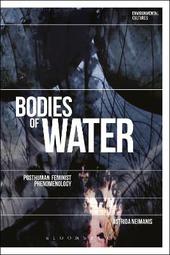
|
Bodies of Water: Posthuman Feminist Phenomenology
Paperback / softback
Main Details
| Title |
Bodies of Water: Posthuman Feminist Phenomenology
|
| Authors and Contributors |
By (author) Dr Astrida Neimanis
|
| Series | Environmental Cultures |
|---|
| Physical Properties |
| Format:Paperback / softback | | Pages:248 | | Dimensions(mm): Height 234,Width 156 |
|
| Category/Genre | Phenomenology and Existentialism |
|---|
| ISBN/Barcode |
9781350112551
|
| Classifications | Dewey:305.4201 |
|---|
| Audience | | Tertiary Education (US: College) | |
|---|
|
Publishing Details |
| Publisher |
Bloomsbury Publishing PLC
|
| Imprint |
Bloomsbury Academic
|
| Publication Date |
30 May 2019 |
| Publication Country |
United Kingdom
|
Description
This book is available as open access through the Bloomsbury Open Access programme and is available on www.bloomsburycollections.com. Water is the element that, more than any other, ties human beings in to the world around them - from the oceans that surround us to the water that makes up most of our bodies. Exploring the cultural and philosophical implications of this fact, Bodies of Water develops an innovative new mode of posthuman feminist phenomenology that understands our bodies as being fundamentally part of the natural world and not separate from or privileged to it. Building on the works by Luce Irigaray, Maurice Merleau-Ponty and Gilles Deleuze, Astrida Neimanis's book is a landmark study that brings a new feminist perspective to bear on ideas of embodiment and ecological ethics in the posthuman critical moment.
Author Biography
Astrida Neimanis is Lecturer in the Department of Gender and Cultural Studies at the University of Sydney, Australia. She is the co-editor of Thinking With Water (2013).
ReviewsFor the last couple of decades, feminist theory has been immersed in a new materialist wave that has produced among the most innovative and capacious ways to think and to respond critically--ontologically, ethically, and politically--within the depths of the ongoing ecological crises. If hardly any field of philosophy, cultural studies, or science studies has been as well-equipped to think the posthuman turn as feminist approaches have, Astrida Neimanis's Bodies of Water brilliantly synthesizes, illustrates, and continues this feminist ebullition. * Hypatia *
|